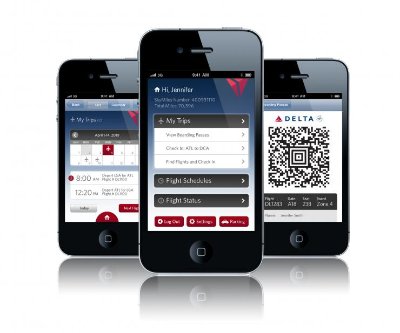Hint: Because your job (and the company future) depends on it……
Over the last 10 years, I have met with hundreds of B2B execs in the manufacturing and distribution space. Regardless of industry the story is often the same… the marketing team runs the corporate website and the IT organization manages the customer portals. Unfortunately, this approach has one problem. It doesn’t work. Here’s why….
Imagine if you needed to book a flight on Delta.com. Instead of logging into one of their well-designed mobile or web apps, you are sent to a bland login screen which takes you to a portal page without graphics or images resembling an online spreadsheet. Would you continue? Most of us would not.
 You see…the Delta marketing team gets it. They have partnered with the IT team and invested millions (or more) into better tools for their existing customers. In fact, Delta has shared that they focus more marketing dollars on commerce tools for current customers than they do to attract new ones.
You see…the Delta marketing team gets it. They have partnered with the IT team and invested millions (or more) into better tools for their existing customers. In fact, Delta has shared that they focus more marketing dollars on commerce tools for current customers than they do to attract new ones.
Great commerce experiences are the new norm for airlines, banks and retailers and it will soon be expected from B2B marketers as well.
Now, let’s apply that experience to a B2B company like a manufacturer or distributor. The marketers have just started to deploy their “digital plan” by investing in better tools for their corporate website. They may have purchased a CMS tool or hired an agency to redesign the site. But what happens when their wholesale buyer finally decides to make a purchase? Typically they are given an ERP portal with a user experience circa 1995. Or worse, they are required to do business the old-fashioned way and email purchasing to set up a PO and an EDI order. Bottom line, the buying experience in B2B is still not “digital”. Meanwhile, a new competitor has entered the market with a decent product but a wicked-fast online portal that makes it easier to find a part, order it and have it tomorrow. Who gets the order?

Ultimately, there are 3 reasons that today’s b2b marketers need to partner with IT and embrace commerce as the last mile of their digital strategy;
- Loyalty – Combine great products with a reputation of being “easy to do business with” and you will see more orders more often.
- Cost – Commerce can often reduce the need for additional headcount during high season and can reduce error rates processing orders.
- Survival – Many B2B companies including wholesalers are starting to see online competitors pop up and quickly steal market share.
As a marketer, it is important to anticipate changing market factors. There is no question that both the buyer and their buying habits are changing. Give them a better way to purchase your products and it will likely be a game-changer. Who knows?…. Your job might even depend on it.
You can also view the original post on my Linkedin page – by clicking here
This article was syndicated from Business 2 Community: Why B2B Marketers Need to Embrace eCommerce
More Sales & Marketing articles from Business 2 Community:




